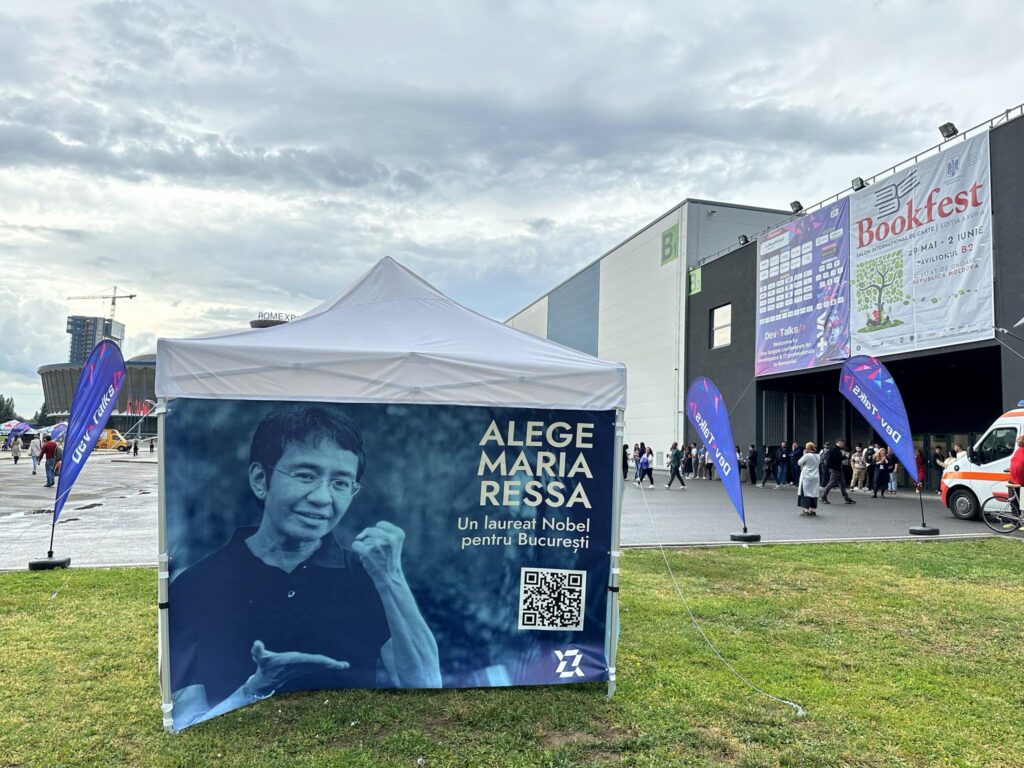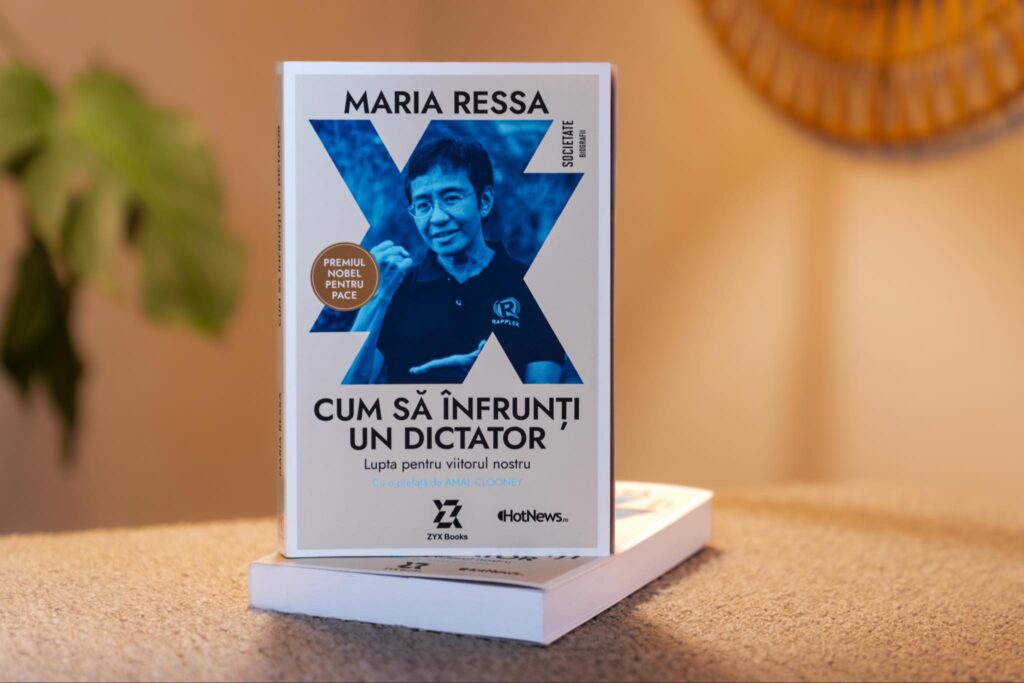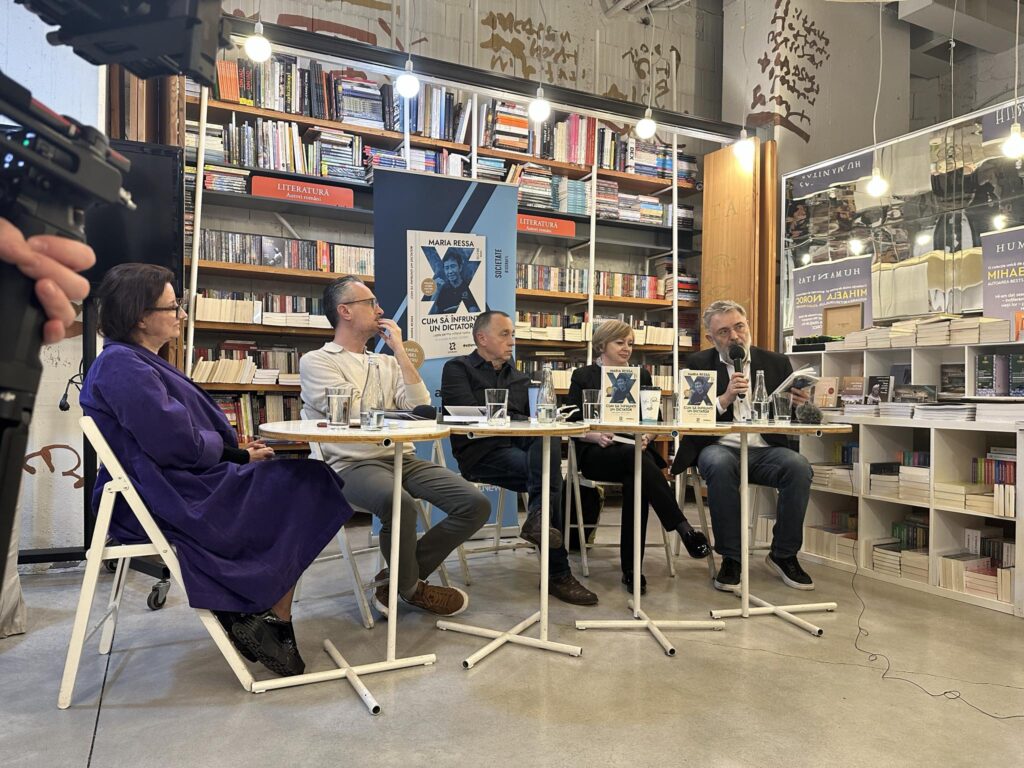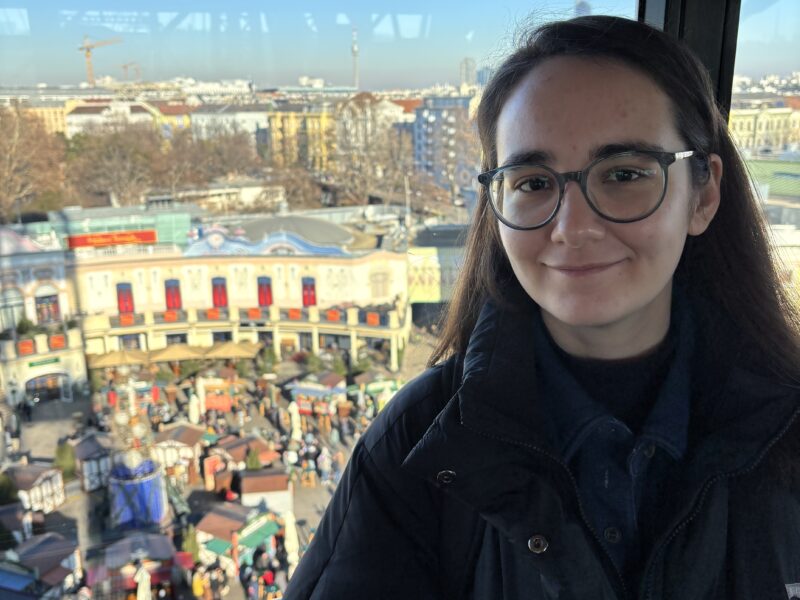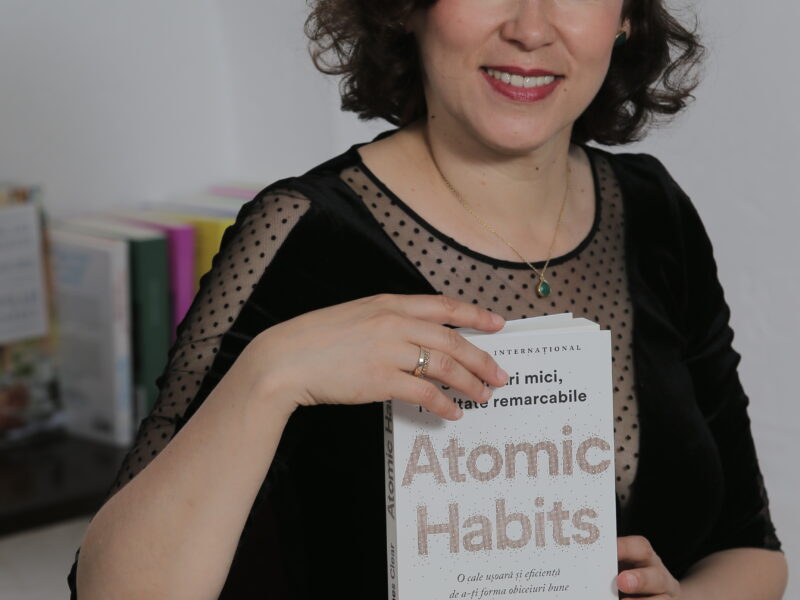Alexandra Rusu is CEO and editorial director at ZYX Books, a publishing house that is part of the ZYX Media Group. She's been reading for as long as she can remember, worked in publishing since college, and wrote her own stories when she won the battles with procrastination. After graduating from the Faculty of Foreign Languages and Literatures at the University of Bucharest, she received a position as a copy editor at Humanitas Publishing House, where she worked for five years, becoming a senior editor. Then, it followed the Romanian division of the De Agostini Publishing House, then ALL Publishing House, where she inaugurated and coordinated the Fiction Street collection, then it was Vellant Publishing House, for which she held the reins of the Endorfiction fiction collection, and then it was Nemira Publishing House, where she was the editorial director. In 2012, she co-founded Booktopia, the first Romanian social network dedicated to readers, which she led with great creativity for five years. From 2022, she coordinates the publishing house ZYX Books. When she's not selecting, editing or promoting other people's books, she's writing her own. Huptilup: A Rock-solid Story with a Sea Sponge that absorbs the enthusiasm of young and old readers, and The Book of Snots which is already at its second edition. The cataineer Maurizio and the three princesses of the story ensure its longevity in contemporary Romanian children's literature. Alexandra is very good at polishing the cornerstones of important projects of the Romanian book industry and raising sustainable constructions made of books, people and stories.
You read, write, select, edit, launch, promote books; among others. What were, over time, from the first readings until now, the books that for you, in the words of cataineer Maurizio Furlini, "powdered cheeks and licked pallor, stitched wounds and dug into living flesh, raised walls and toppled empires”?
I think my relationship with reading is based on the same awe as when I opened the first book: look, there are some things that walk around the world and say everything I can't say. There are some mouths that somehow also speak on my behalf - maybe this is where the desire to smooth their path came from. As a child, due to health problems, I spent some months in isolation. Then the books proved a usefulness that is more comfortable to understand only with the mind - they set in motion some vital springs, I would say. This created some expectations from every book I opened after that, which is a little unfair, because not all of them can play the role of essential companion. But I wanted to say how it all started, because all the choices were built on that moment of connection with no rest and no alternative.
My shortest list, therefore, starts with Heidi the Mountain Girl and Carrot Head, two books about that area of childhood where you feel terribly different but manage to make something good out of it. When I was a teenager, I read some romances romancefrom my grandmother's library, which it is fair to mention because they had an impact, especially in imagining couples' relationships Spider's Web by Cella Serghi, Gone with the Wind by Margaret Mitchell, a book with historical pretext called Via Mala, Dickens with Great Expectations, all of this seasoned with Fowles, The Collector, Virginia Woolf, The Waves, Thomas MannJoseph and his brothers. I know, it sounds like a hodgepodge, but what I have gained are some eclectic tastes, which help me not to have inhibitions and no well-defined plot as an editor. Then came the more hardcore years, when I discovered Joyce, with Ulysses, and nothing was the same. All my obsessions with Greek myths and some of the biblical stories found a kind of paroxysmal fulfilment, full of dark humour and sexual allegories. Hard to match, to this day! There are a few writers I would read anything from, plus a poet: Elena Ferrante, Paul Auster, Elizabeth Strout, Cormac McCarthy, Tatiana Țîbuleac. And the poet is Ada Limón. Jeanette Winterson remains in a category only of her own, especially with Why Be Happy When You Can Be Normal, a book that taught me what freedom means when we talk about literary genre and how much power the hybrid, the undecided, the unclassifiable has. In addition to Elizabeth Strout's Olive Kitteridge, in terms of characters, I have Isserley at the top of the list, from a book you won't see on bookstagrammers, maybe only in second-hand shops: Under the Skin by Michel Faber. It's a strange book that broke me down. This creature sewn into a human body, who hitchhikes around Scotland and has a horrible job but tries every day to keep his hard-earned humanity, casts a unique perspective on our world - that of an alien Jesus full of curiosity. And the latest seminal book: Nick Cave's conversation with Seán O'Hagan, called Faith, Hope and Carnage - a stellar piece that's simply not afraid to touch on any theme, any saint, any skeleton.
From 2022 you are the CEO and editorial director of one of the newest publishing houses in Romania, ZYX Books, part of the ZYX Media Group. Your career path seems marked by cornerstones and foundations. You are a woman of beginnings. How did the story begin at ZYX, where is it going and what is your role?
Yes, I think I've been lucky to go through the process of building something from scratch a few times, whether we're talking about book collections or launching online platforms. I love beginnings, they borrow more of your energy than any other context. I like to look at the agenda sheet from the first brainstorm and put next to it the tower of books it turned into in the end. The difference is that at ZYX Books, which just turns one year this month, I'd like to stay for a truly indefinite term, maybe even until it's Coming of age!
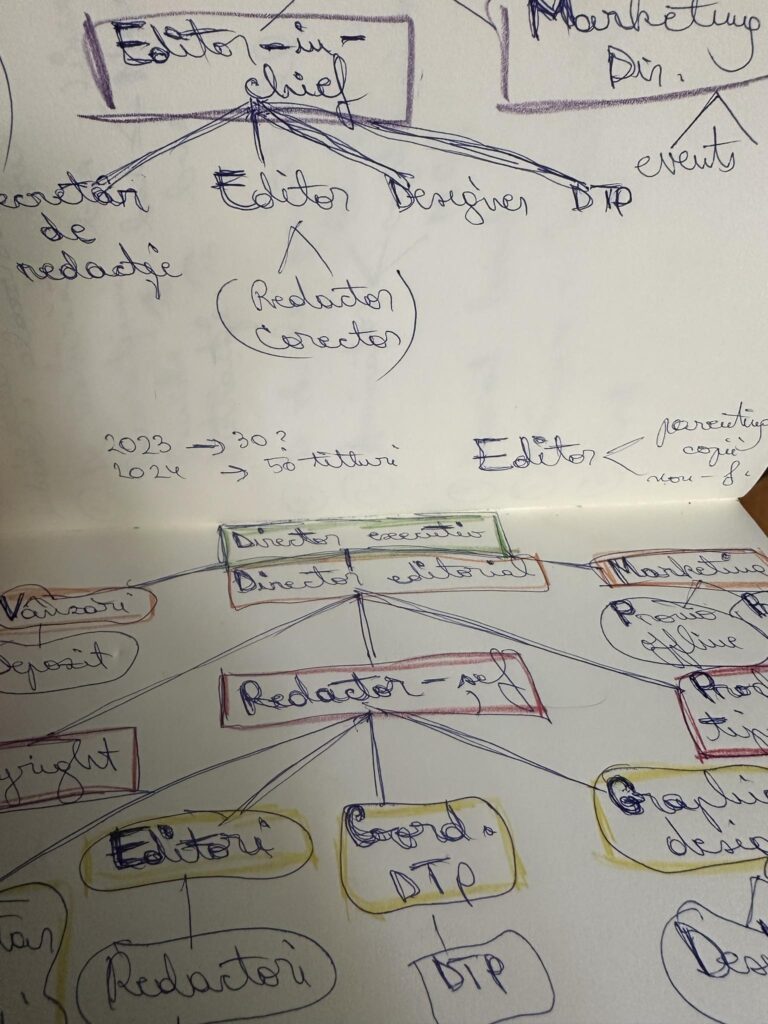
ZYX Books is for me – and for most of the team members – a coming-of-age project. We're a boutiquepublisher that aims to publish non-fiction titles that matter to their audience, useful first as a change of perspective, then in a practical sense. We do not rely on a large volume of titles, but on great attention to the editorial selection and the way we "wrap up" the book. We rely on the relevance of each title and the engagement of directly interested communities. In the last 15 years, I have always had the feeling that a lot is published and very little is read, that we are dealing with enormous competition between the books on the shelf for the time of a rather small audience anyway. We are curious and stubborn people, so we will really try to see if there can be a way to publish that is „greener” in the broad sense, less quantitative and more relevance-oriented. More specifically: we aim to publish around 20-25 titles per year, chosen according to the interests of a community of potential readers, validated by specialists and professionally worked on. We will publish our books Out of Community, Into Society – the slogan of ZYX Books – but only if they are worth it in all these aspects.
Along with the main direction of the publishing house, the one dedicated to parenting and education books, this year you also launched the Society and ZYX Kids. What are the criteria by which you select titles, what's next and what are the promotional tools you use to reach readers?
I started, really, with a direction that is more of a mission, namely practical psychology books for parents - of small children or teenagers. I was also surprised to find that these titles are also requested by teachers or educators, but also as working tools for psychologists. To this direction was naturally added ZYX Kids, emotional education books for children up to 10 years old, on topics similar to those of parenting books - as a pretext for family conversations. Also naturally added is a collection of books on society, on topics ranging from democracy and technology to extreme climate change and its effects. I have a great passion for hybrid genres and especially memoir – an area we aim to grow.
The selection criteria are three - and we don't really stray from them: the relevance for the public (what a possible reader is left with after the book), the validation of specialists, the uniqueness and humanity of each book. Because we don't publish many titles, we can afford to take care of each one, build a small ecosystem of supporters for it, capture its strongest message and express it on various platforms. We are still exploring promotion formats, from generating news where we have material, to organizing parenting workshops on puberty, for example. As it always happens, we get the best results when online and offline go hand in hand, as was the case with Maria Ressa's book, where we did an unconventional campaign: Vote Maria Ressa! A Nobel laureate for Bucharest. We presented the famous Filipino journalist as a candidate for the Bucharest City Hall, with an electoral tent and all that comes with it, in the idea that she knows a lot about democracy and the importance of free elections. Her book is also a little course in critical thinking in the age of fake news, especially in volatile contexts like election years. So, vote Maria Ressa – vote to make an informed choice!
A curiosity I've been bearing for some time: how did you get the translation rights for Maria Ressa's book How to Stand Up to a Dictator, the one that opens the Society collection? I imagine it was a close competition.
It was indeed an auction with many participants, and we were in the first weeks, if not days, of ZYX Books. We really wanted this book, because we knew how much energy we have on topics such as freedom of expression, manipulation in social media and fake news, the extent of extremist discourses and the danger they represent. We are part of a media trust, ZYX Group, with journalists who respect their profession, who are very interested in carrying on Maria Ressa's message. All these things were linked in a proposal, which I think it was coherent and convincing on the promotion side, but they were also reflected in the financial offer. We didn't get the book submitted because we were so new to the market and hadn't communicated the new project to literary agencies yet. It was a wonderful coincidence – I had just discovered Maria Ressa as a conference speaker, then I started following her, and when I wrote to the respective agency the manuscript had just started circulating. I think the genuine interest was also felt in the editor's letter that accompanied the offer, where I told how I was hunting for totalitarian metaphors in children's books from the time of communism - after you do that, it's like you start to value the freedom to say and write.
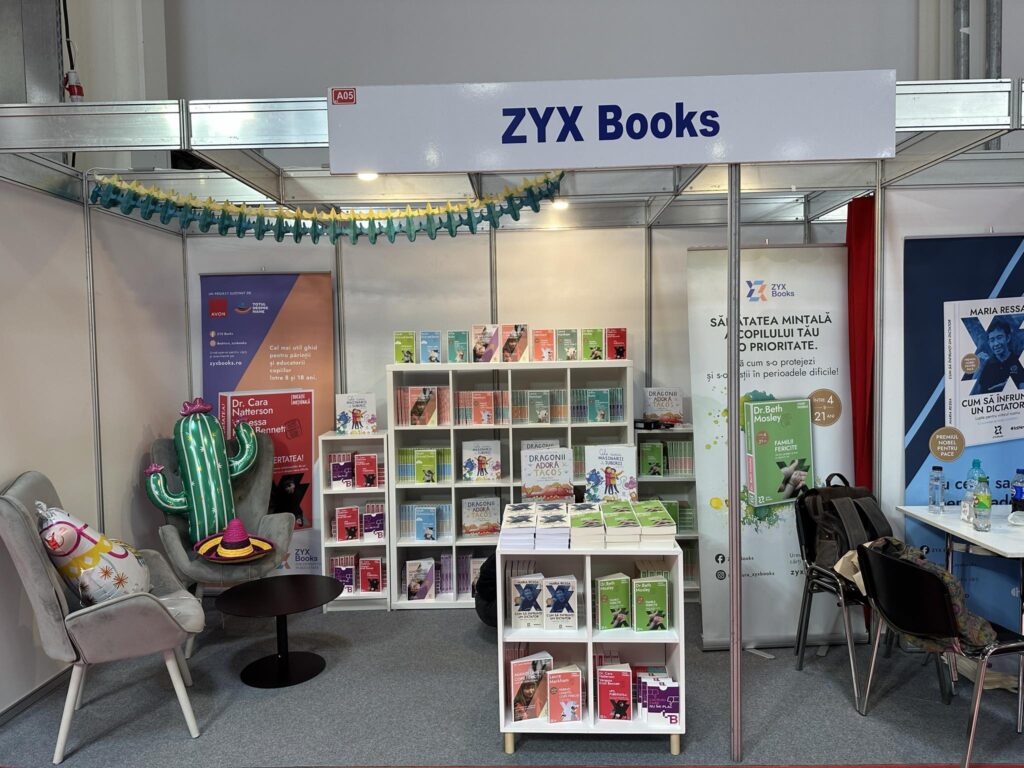
You started your career in the book industry in 2004, when you joined Humanitas publishing house, where you were a senior editor for five years. How did you end up at Humanitas and what was the publishing world like back then?
I arrived at Humanitas the day after I got my bachelor's degree (with a thesis on Joyce), on the recommendation of the exceptional teacher who was Mihaela Irimia. They were looking for people to train, among the best students of the year, and „Aunt Mickey”, as we called her, recommended us - me and Michaela Niculescu, „Mica”, another woman of vast intelligence whom, unfortunately, it's no longer among us. Honestly, going straight from college to the office at Humanitas was like going on vacation to the moon – I felt very lucky and for a while intimidated by that chance. Then I recovered :). I started as a copy editor and became a senior editor over the years, I can't recall the exact timing anymore – in fact, I think the senior editor tag meant that I also had a role in the discussion on the titles, in the selection.
The publishing world looked a lot different than today, it was in its romantic period, with all the good and bad of it. We would smoke in offices and have book discussions that would last for hours and they didn't start with „from a marketing point of view…”. We read aloud to each other from manuscripts, we took books very personally, we were cynical-idealists. For me, Humanitas was a school and I had someone to learn from. And I'm not just referring to the very well-known names from whom I stole my craft, such as Radu Paraschivescu or Denisa Comănescu, but also to the less visible people: DTP-ists, proofreaders, copyright managers. At the time, I had nothing to compare them to, but I sensed that these discussions we had were formative; and now, when I have a term of comparison, I consider them genuine professionals, people who know their job and do it to the point, regarding that they are either in a good mood or under pressure and tired.
What did the work at Humanitas entail, and what was the relationship between the knowledge gained up to that point in school and the „craft” learned on site?
At Humanitas, I was fiction editor on translations from the Anglo-Saxon area. I have edited from Nabokov, to Cormac McCarthy, Anaïs Nin, Douglas Coupland or T.S. Eliot, but I also occasionally entered non-fiction, Romanian writers or other cultural areas. I was passionate about the faculty I did, I majored in English modernists before my bachelor's degree and British cultural studies after, so the thing that made sense in those early years of publishing was that I was really applying what I had studied. So, I was working on a familiar subject that I wanted to deepen, hunting for new writers to translate into Romanian and dissecting their sentences, analysing, measuring, weighing - it's very grassroots work that can become tiring or even obsessive, but for those who want to understand from the inside how a literary text works, what this writer did here, is one of the possible approaches. It seems to me that today there is less and less time for hard work with the text - and, unfortunately, it is shown in the books. But AI will come and solve it all :).
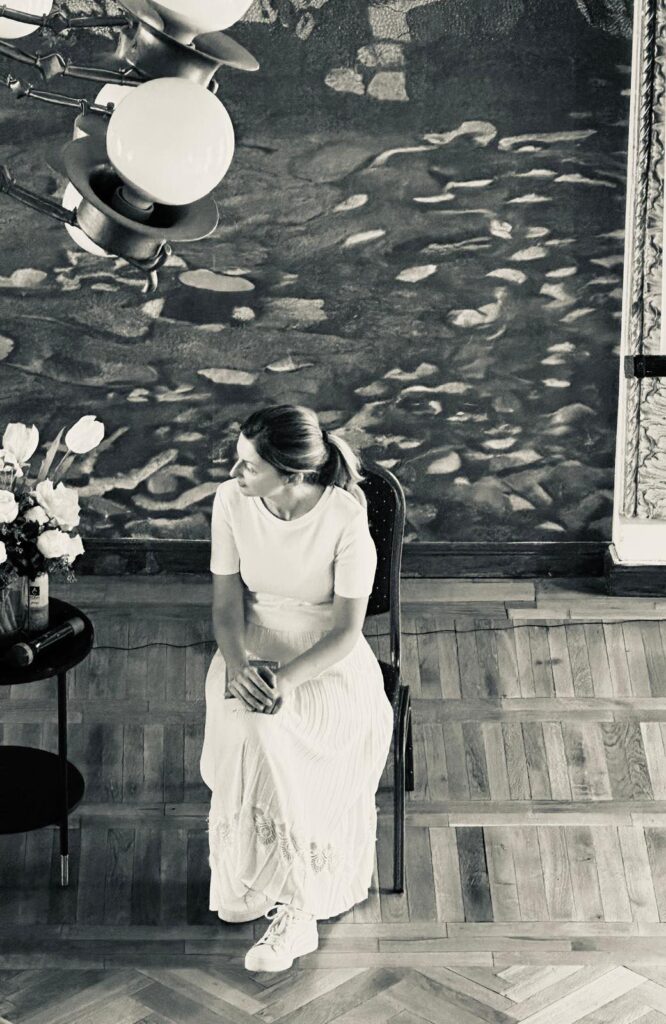
After a one-year detour at the Romanian division of the De Agostini Publishing House, you worked at the ALL Publishing Group as editor-in-chief, coordinating the Fiction Street collection, which debuted with novels such as Italo Calvino's Invisible Cities and Jean Teulé's The Suicide Shop . What were the years like at ALL and how did you build up this collection?
Fiction Street is a project for which I have a kind of nostalgia, I think I mixed some good ideas and some naiveties in it. It was my first experience leading a team – I was 26 years old and the youngest in the editorial department. The collection itself started from the idea of putting together more demanding literature and bestseller literature, inviting the public to taste each, to test, to give themselves more freedom to discover. Invisible Cities is still one of my favourite books today, and the collection stayed on the market for quite a few years, so I think it brought something fresh, a bit of playfulness, to the otherwise quite sober literary landscape.
In 2012, you co-founded and coordinated for five years Booktopia, the only Romanian social network dedicated to readers. How did this project come about and how did you manage to find the resources to bring technology and books together?
Booktopia was a kind of autonomous Romanian Facebook that aimed to encourage reading by fuelling the thing that motivates you the most to buy a book: friends' recommendations. In a few years the network reached 20,000 members, so we also started doing events dedicated to the community, there are many nice memories. But it was very complicated to keep up with the technology and the other social networks, which were just starting to develop - you couldn't be very far behind them. The investment was from a software company that wanted to test the idea, but the moment it started swallowing more than it was producing, we stopped. Besides, my interests had also turned towards content marketing and I missed bigger projects.
Under the umbrella of Booktopia you have imagined and implemented numerous events and projects. I remember with great joy the Time Capsule from Train Delivery (a continuation of Street Delivery from the North Railway Station in Bucharest) from July 2014, when we sent messages for the future. What were the projects that remained dearest to you from that period and how did they find their place in a book market that seemed to start revving its engines?
There were many fond memories, indeed. The book market seemed to be unravelling during those years. At Booktopia it was fabulous that we had an idea and the next day we put it into practice: Time Capsule, Blind Date with a Book (a Valentine's Day at which the Humanitas Bookstore at Cișmigiu was full), the Reader's Tribune (a kind of tribune like in Hyde Park, where people came to say what they liked and what they didn't about books), the Reading Marathon (10 hour of relay at a Bookfest).
After the Booktopia experience, you returned to publishing, coordinating the fiction collection of the Vellant publishing house, Endorfiction, where courageous titles appeared. Why this return happened and how much did the smaller size of the publishing house and the peak that the book market had reached in those years contributed to the freedom enjoyed in the selection of published titles?
I came to Vellant because I missed publishing – I had taken a 5-year hiatus where I built Booktopia, then went into digital marketing. When I received the first submission after 5 years, in the inbox at Vellant, my heart was pounding. I've always had naiveties like that, I still do. I also know what book it was, I read it over the weekend and on Monday morning I made an offer: The Seventh Function of Language by Laurent Binet. The titles chosen for Vellant are my favourites, especially Fresh Water by Akwaeke Emezi, Die, My Love by Ariana Harwicz, The Flamethrowers by Rachel Kushner, Her Body and Other Parties by Carmen Maria Machado. They are authors who grew later, who will continue to grow - my enthusiasm then and now is just as great for them. It was a match between my deeper tastes and the portfolio of Vellant, a boutique publishing house that publishes a little, fine, and a little on the loose. Freedom of choice and trust in the publisher mattered a lot - things worked out best for me in such contexts, constraints inhibit me more than responsibility.
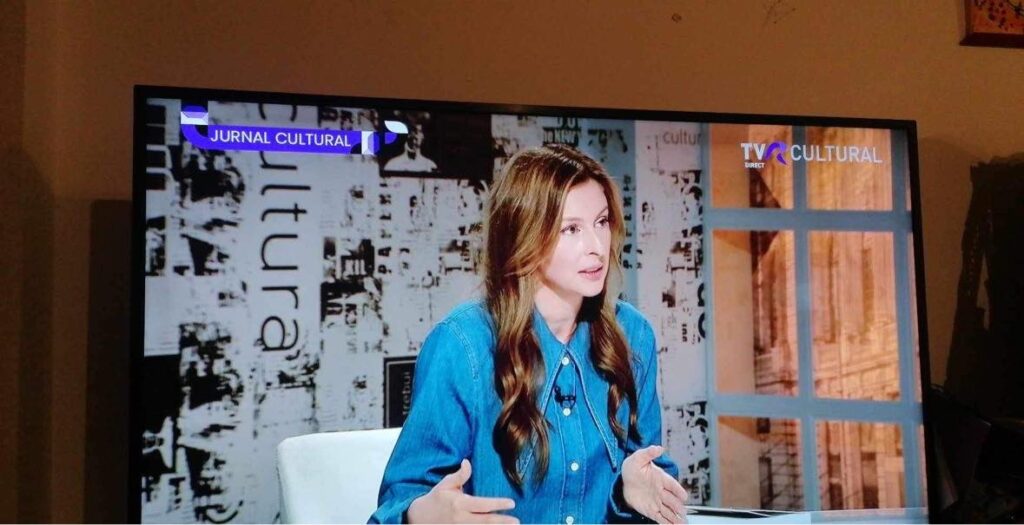
The pandemic years found you at the Nemira publishing house, where you were editorial director. You coordinated a team, oversaw the publication of many books, and produced an online anthology, Isolation. What worked in those years, what had to be invented and what were the biggest leaps you went through?
At Nemira, it was the hardest start – I took over the team as editor-in-chief, and after two months, when we had just started to get to know each other, we went into lockdown. I then worked for a year and a half almost exclusively online, took over the responsibilities of editorial director and slowly made the transition to the hybrid system. Together we invented a way of working for which no one was really prepared, and it very quickly became functional, even high-performing, judging by the large number of editorial novelties put on the market in those years. For me Nemira was a very good experience, another level of learning – on the selection side with commercial goals and as a team manager. On the editorial side, the Isolation anthology remains a unique experience, in my personal top three projects. The speed with which the involved authors responded to me, in that context with sirens in the background, a kind of solidarity and trust that writing will help, will propel us all towards the end of a collective nightmare - all this is unrepeatable. And also, from those years I would like to mention a totally atypical book, Forgotten Herbs. The New Old Kitchen by Mona Petre, a sort of botanical atlas / recipe book / culinary history. There is also a novel that I really liked: How Much of These Hills Is Gold by C Pam Zhang - about two girls who make their way through the Wild West, once the gold rush is over and the fight for survival is in full swing. A book about how many hundreds of thousands of immigrants the history of America hides, but first of all a splendid female anti-western.
You're not only a curator of books written by others, but you've also published your own children's books, Huptilup: A Rock-solid Story with a Sea Sponge and The Book of Snots, a super-funny fairy tale that already has two editions. How did you make the transition from editor to writer and how did these volumes come to be?
I think I'm 90% editor and 10% writer - a girl’s gotta do what a girl’s gotta do. Jokes aside, I'd obviously like to reverse that percentage. Not because I want to see my name written in the biggest font on a cover, but because it's really a great happiness and a great freedom to write your stories. Writing has always interested me the most, but it has also inhibited and knocked me down, it's a field on which, if you want to move forward, you have to win the postponed battles. Therefore, editing was and is a second best, the relationship to live with – and to live from. I wrote The Book of Snots ten years ago and I'm glad that it survived on the market - the Arthur edition is illustrated by the super-talented Ioana Vălimărescu and edited by Florentina Hojbotă, the man who put the most important children's books on the market in the last 15 years. Huptilup is a funny story on a serious topic, neurodiversity, for which I received a brief from Doru Someșan, an editor with a special „nose” and a non-conformist vision for which I appreciate him a lot.
Speaking of publishers, I'm actually looking for the ideal publisher of a book I just finished. It is written together with Maria Tănăsescu and is called Women at The Border. What We Say to Ourselves When No One Reads Us, a volume of fictional letters of two women in midlife. So far, the manuscript has been read by a few people whose opinion we care a lot about: Simona Popescu, Dan Coman, Anastasia Gavrilovici, who encouraged us so much that our ears went red. Now we are waiting, looking for the right publisher, both as a portfolio and as a relationship - because this writer-publisher relationship is very important and long-term.
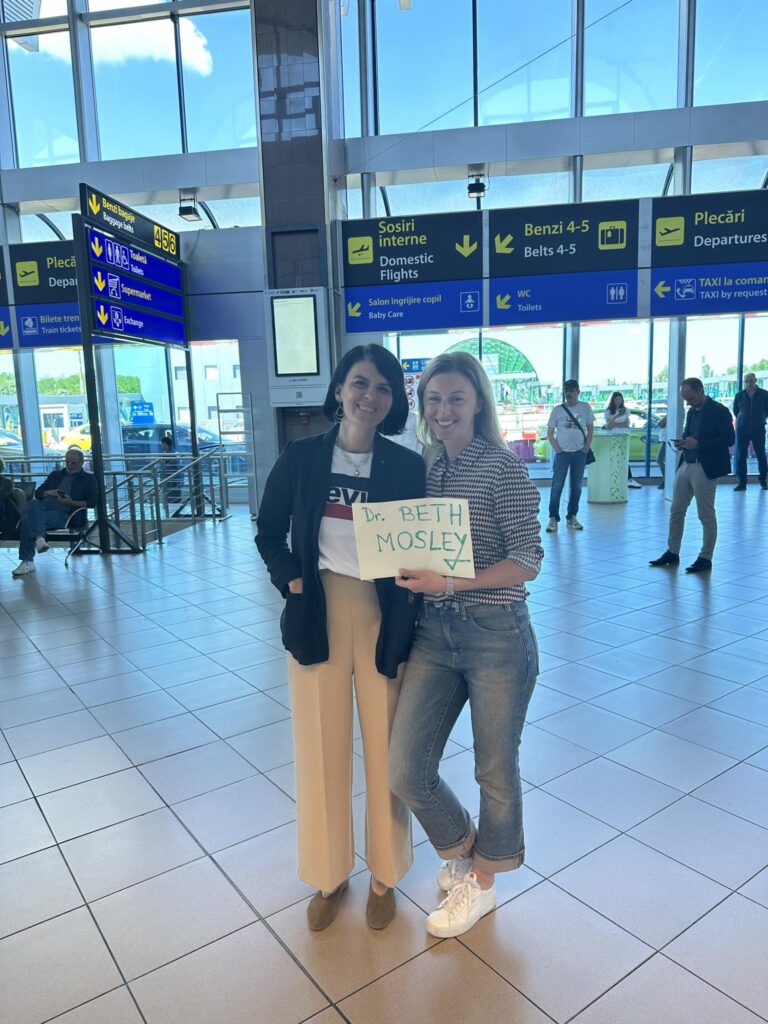
You once said you were "a combination of firefighter, psychologist, peace negotiator, net acrobat and wordsmith". Juggling with all of this, what have been your biggest professional achievements so far?
Objectively, I have already mentioned them above. Subjectively, the ZYX project is the closest to me, I think it represents me the best in terms of mission and desire to explore, by the way, what we can do around books. For me, publishing doesn't end once you've sent the book to print, that's just the beginning – I like to create ecosystems around books, to turn them into tools for social awareness on certain topics, which I feel are urgent. The biggest professional achievement is that I feel represented by every ZYX title, up to this point. If I had to choose, still extremely subjective, between them - at the end of the summer we will publish the first Romanian memoir about postnatal depression, a brave, poetic, authentic approach to this hitherto untouched literary theme. The fact that we took on this project, not yet so firmly entrenched in the market and in the public consciousness, is a source of joy and intense anticipation.
[[The photos are part of Alexandra Rusu's personal archive. Main photo: Creazyx.] [Translated into English by Edward Vasile.].]


